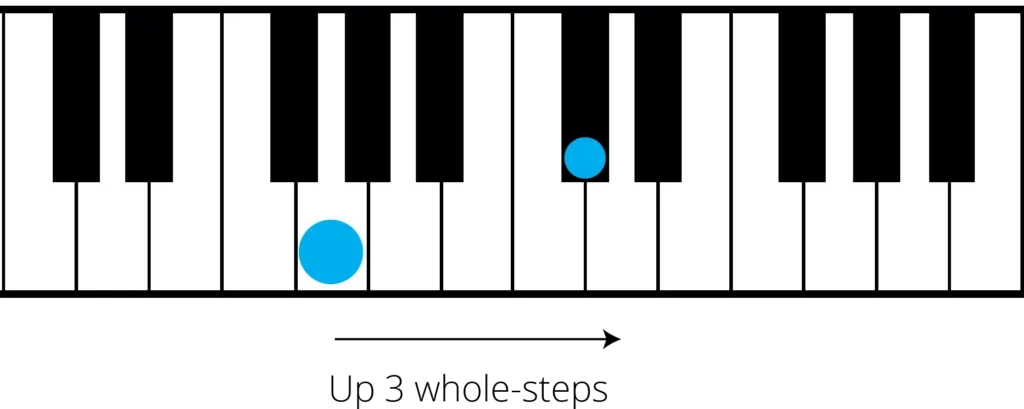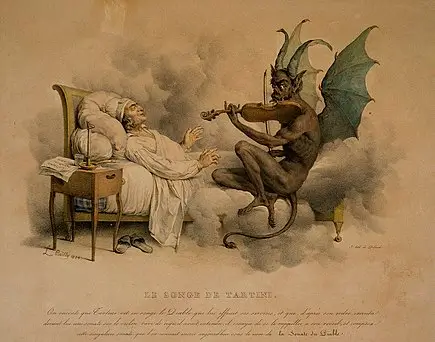Tony here! In a previous post discussing the decisions behind our logo redesign, we lightly touched on some of the meaning behind our branding choices.
So, let’s continue the discussion and talk about our name, 3tone Digital. People keep asking what it means, so here you go:
TL;DR
3tone is a play on the word tritone, a chordal interval in music theory with an interesting history.
Music theory & code
As a self-taught pianist, who isn’t very good, but someone who simply enjoys the process of songwriting through the use of chords, melodies, and words – music has been a hobby/passion of mine since I was a child.
I started playing piano around 9 years old, and then guitar at 11.
When I was a child, my Grandmother took nursing classes at a community college. She’d bring home lots of textbooks, both related to biology and other subjects – and after a couple semesters we had a small collection of music theory and computer books.
And seeing as there were only 3 channels on our TV in early 90s, I spent a lot of time reading those books!

My first computer
As luck would have it, right around this time my Grandmother and I found a working Commodore 64 that our neighbors left out on the sidewalk.
I got really into this computer. It was all so very exciting and I wound up learning BASIC programming over the course of a summer.
This was back in the day when there was no internet of course, and the only other thing I knew was music so I tried to write a program to return/guess ‘the next chord’ in a sequence using something called the circle of fifths.

The circle of fifths is a way to identify the sharps and flats of a scale and find the relative major or minor of a chord. It’s helpful when transposing a song between keys or playing by ear.
While I didn’t succeed in writing this computer program, the actual process of trying to do so really got me into code and exercised my practice of music.
Music theory 101:
There are a few types of chords/intervals, each of them has their own tone:
- Major chords (happy sounding)
- Minor chords (sad/dramatic sounding)
- 7th chords (jazzy/fancy sounding)
- Augmented & diminished chords (connect/passing chords)
- And then there’s the tritone:
There are two very different and distinct feelings of a tritone:
The positive tritone:
The negative tritone
If you know these songs, or click through to check them out on YouTube, you should be able to hear the differences. These differences are based on how this interval is used.
The difference between the sound depends on context, underlying root note, and the next chord played.

Oh, a chord? Boring, Tony!
But hey hold on, there’s more! You see..
Once upon a time, the tritone had a bad reputation with many Renaissance composers. Some believed that the tritone could bring bad luck and the interval was even dubbed the “diabolus in musica”.
The tritone was heard and known as an extremely dissonant interval and was literally avoided in compositions for hundreds of years – even leading to worldwide superstitions.

It actually went so far that the church’s musical guidelines enforced its suggestion of avoidance.
Not a ban, just a suggestion to avoid it. But, there are unconfirmed stories that composers were excommunicated by the church for invoking this interval.
Despite the chord’s ominous nickname, and supposed curse surrounding it, the tritone eventually found its place in popular music over the past few centuries.
Composers and songwriters now use the tritone freely and creatively, not only to add tension, but more importantly: to resolve tension and keep things interesting!
With that said, a good website is like a good song, both in making and listening to one. And a great website sets you and your business apart. And a good metaphor can be used at anytime.
A bad website, like a bad song (e.g. Milli Vanilli’s “Blame It On The Rain”) can fall flat on its face due to disorganization, missing or messy cohesion between sections, device output differences, or just missing their own tone and personality.
We believe in embracing what makes us different, like the differences in the two sounds of the tritone and never being satisfied with staying static, finding beauty in chaos like the resolution of the tritone. Deep.
Anyways, I already wrote a jingle. Do you want to hear it?


